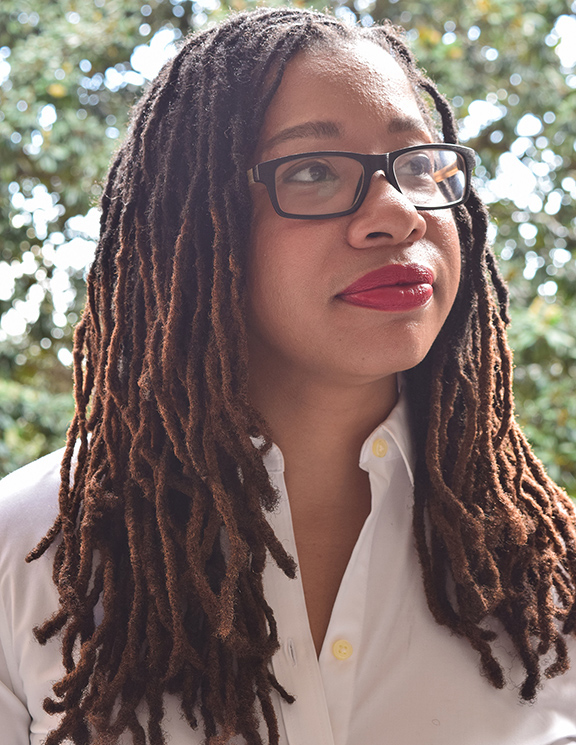Faculty Spotlight: Alisha Gaines, Associate Professor of English
Alisha Gaines is an associate professor in the Department of English, part of Florida State University’s College of Arts and Sciences.

in the Department of English.
Tell us a little about your background
I grew up in Northeastern Ohio in both Cleveland, its suburbs, and Akron, what I semi-jokingly call the “Lebron James corridor.” I grew up a token black girl in nearly all-white educational spaces. From middle school to high school, I was one of the only black girls in either traditional classrooms or extracurricular groups. I never had a teacher of any color until I intentionally enrolled in a historically black college for women, Spelman College. Spelman was transformative for me. I was able to see myself validated as a thinker, learner and eventually, a professor.
When did you first become interested in the African American, gender and sexuality, and cultural studies area that you work within?
I fell in love with reading as a little girl. I read anything anyone put in front of me. However, I was most often only introduced to white girl protagonists like Anne in “Anne of Green Gables” and Jo in “Little Women.” Although I loved those characters, and still do, part of my little black girl self knew these were not my stories. I wasn’t introduced to Zora Neale Hurston until I went to college. There, I learned that my nerdy, reading self could be seen and represented in and by literature.
What are your current research interests, and what makes you passionate about them?
I am currently interested in where my first book, “Black for a Day: White Fantasies of Race and Empathy,” ends. That book detailed a genealogy of white, mostly liberal folks, who temporarily “passed for black” in order to understand black identity during important moments in American history (segregation, the Civil Rights movement and the spurious “post-racial” moment of [Barack] Obama’s election, to name a few.) Rather than detailing, as I did in my first book, how cross-racial empathy fails in what I call a “genealogy of empathetic racial impersonation,” this new work takes the potential for empathy seriously by visiting public history sites that offer reenactments of slavery and civil rights. I want to understand how these temporary performances of “slave play” or “Jim Crow play” offer real empathetic work. Although I am skeptical, I am open to thinking through how reenactment can engender empathy.
What do you want the public to know about your research and work? Why is your topic important?
My topic is important because I think white folks are desperate for models of good empathy and “ally-ship” in this current sociopolitical climate. It’s time to talk seriously about privilege, appropriation, performance and race. It’s time folks of color stop shouldering the brunt of this work. It is time for allied white folks to start taking up anti-racist work without burdening their colleagues and friends of color. I hope my work inspires that impetus.
Who are your role models? Who has influenced you most in your life?
Let me be cliché first and say, truthfully, that I am inspired by my mom and Grammie. Grammie, now 90, was an elementary public-school teacher in Cleveland, Ohio, for upwards of 30 years. But, I am also inspired by many other people … mostly black women. Ida B. Wells is an inspiration. So is Angela Davis. Ava Duvernay inspires me and so does Oprah. So do Beyoncé, Jesmyn Ward, Toni Morrison, Janelle Monae, Michelle Obama and Janet Mock.
What brought you to Florida State University? Why do you enjoy working at FSU?
The job market brought me to Florida State, but students made me stay. Our students are curious and engaged. I am so happy to work with first-generation students, queer and trans students, students of color and intersex students. I learn more from them than all my Oprah podcasts.
What is your favorite part of your job?
Teaching is my favorite part of my job. I love research too, don’t get me wrong, but I couldn’t be a good researcher without the sharp ideas brought by my students.
What is the most challenging part of your job?
The most challenging part of my job is advocating for my students and colleagues for which academia was not originally built. As women, folks of color and queer folks, we often have to make arguments for our inclusion, our worthiness and our purpose. It can be exhausting. Diversity and inclusion is a great goal … but, are we making that happen for real? Is it just lip service? And who is accountable for attaining that goal?
How do you like to spend your free time?
I spend my free time with my family. I read. There is so much to read! I do yoga, I listen to podcasts and I cook.
If your students only learned one thing from you (of course, hopefully they learn much more than that), what would you hope it to be?
In my Introduction to African American Literature class, I joke that the only thing I want them to learn is how to properly pronounce W. E. B. Du Bois’ name. It’s not Web Du-bwah. It is W. E. B. Du Bois (like Dew Boys). That’s just in jest.
I want my students to learn that African American literature is a long, fraught and interesting canon of literature. That Phillis Wheatley, the first African American girl to publish a book, did so in 1773 — before this country’s independence in 1776.
I want my students to know that blackness is not monolithic, that black folks are complex and multi-faceted, and that they can find themselves represented in our literature. If they don’t, I will do my best to give them the tools to write their own stories.
And there’s still so much to read.

